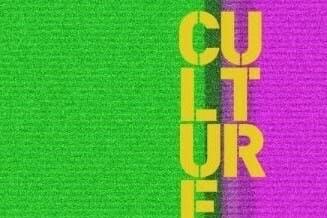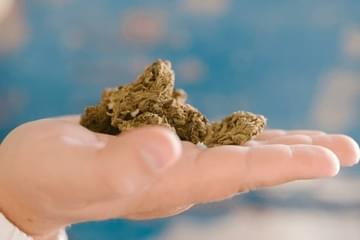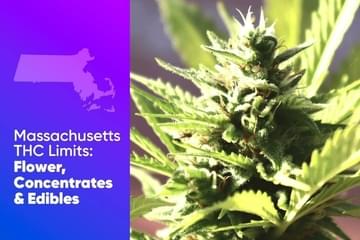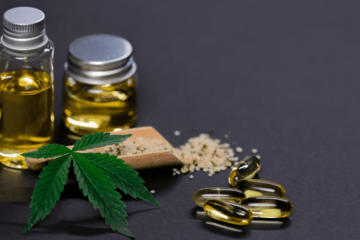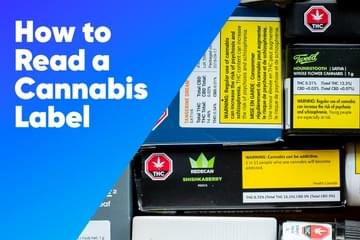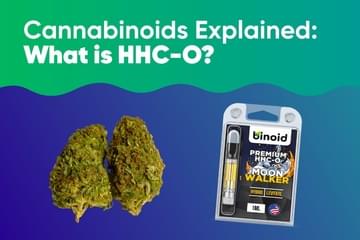
What To Do When Your Dog Eats Weed
Published on 6/15/20
According to a recent study, there are about 63.4 million households around the U.S. that have dogs. That's roughly 76 million K9's scattered throughout the U.S. It's safe to say that Americans love their pups. It's also fair to say, however, that Americans love their cannabis too. In the past two decades, legal cannabis here in the U.S. has become an ever-growing, fully-legal cash cow. At the time of writing, 18 states and U.S. territories have legalized recreationally and another 37 have established some type of medical cannabis program for their residents, and the industry is showing no signs of slowing down anytime soon. So it only makes sense that with so many dogs and so much weed laying around, it only makes sense that the two might overlap at some points!
But don't worry, we here at Where's Weed have your back to break down exactly what to do the next time your furry friend gets into your stash. We'll break down what to do when your pup gets into some cannabis, lay out the common symptoms of dogs eating weed, and provide a step-by-step guide for what to do, who to call, and how to make sure your dog rides out the storm effectively. So with that in mind, let's get right into it!
Can Dogs Get High From Eating Weed?
Yes, if your dog ate marijuana, they will likely get high. And it's actually a massive issue for pet owners, not just some hypothetical, rarely seen incident. According to Tina Wismer, the senior director of the ASPCA's Animal Poison Control Center, there's been an astounding 173 percent increase in cannabis-related ingestion cases since 2017. That's a whole lot of pot products swallowed down by a whole lot of pups.
So with that in mind, let's break down exactly what symptoms to look for when your dog gets into your edibles, the science behind why cannabis effects and could be dangerous for dogs, and what to do about it once you know your furry friend has THC in their system. Here are a few tell-tale symptoms to help you identify if your dog has ingested cannabis:
- Unsteady movements and an unstable balance
- Confused look and dazed eyes
- Nervousness and paranoia
- Dilated pupils
- Low temperature and heart rate
- Dribbling urine
Is Weed Bad For Dogs?

Yes, high levels of THC are very bad for your dog. While a stoned dog might sound like an entertaining experiment, marijuana definitely falls under the category of what not to feed your dog. If you've thought about giving marijuana to dog friends, please don't. Dogs and weed do not mix. Unlike humans, large amounts of THC can be poisonous to many animals and the effects of marijuana on dogs can often cause distress and be downright harmful. Dogs have more cannabinoid receptors than humans do, which means they feel the effects much more intensely. Imagine the highest you've ever been and then double, or even triple that. That's what your dog is dealing with when they get into your stash.
If you're looking for medical supplements for your dog, consider asking your vet about CBD products. Although marijuana is bad for dogs, CBD has not been proven harmful and may even be beneficial to your pets who suffer from anxiety, pain, etc.
Can Weed Kill A Dog?

Marijuana alone has not been proven to be lethal if ingested by a dog. As we mentioned above, THC is the harmful component to your pup if it's ingested in super-concentrated dosages. Most cannabis flower, while certainly not great for your dog, simply don't have enough concentrated and activated THC in it to put them in health trouble. Edibles cooked with cannabis-infused oils and ingredients, vapes filled with concentrates, or tinctures, waxes, butters, or other high-THC blends of cannabis, however, DO have those super high THC levels. Those are the forms of cannabis that will have your pup in trouble.
Generally, there are at least two scenarios that may prove deadly to your dog if your dog does get into your weed:
Scenario One: If Your Dog Gets Too High Alone
When a dog ingests cannabis, the effects will last roughly 24 hours before wearing off completely. During that time, a dog might become extremely affected by the THC that is coursing through its system. Marijuana toxicity in dogs may cause them to throw up; and if your dog is too high, they may fatally choke on their own vomit. It's critical to your dog's health that you never leave it alone if it eats any form of cannabis!
Scenario Two: If Your Dog Ate Edible Brownies
There is a large list of foods dogs should not eat which includes chocolate, alcohol, citrus, caffeine, nuts, undercooked meat, and yeast dough. Like cannabis flower or pretty much any other form of cannabis, edibles are unhealthy for pets to eat. However, they can be especially dangerous because of other potential ingredients, like chocolate. After all, with the craft edibles scene on a rapid rise in the overall cannabis industry, we're seeing more and more types of tasty treats come out that just happen to contain some cannabinoids. If your dog ate edible pot brownies or some other combination of weed and chocolate, there is a chance the combination may prove fatal.
What Should You Do If Your Dog Ate Marijuana?

If your dog is showing any symptoms of having eaten weed or other high-THC cannabis products, the first thing you should do is call your local veterinarian or the Animal Poison Control Center. You will find our recommended response below, but it's only meant to help guide you through making sure your pet is as safe as possible - it cannot replace a professional's medical opinion.
When you first realize your dog has probably eaten marijuana, follow these steps as rationally as possible:
Stay Calm
Your dog is likely going to be okay but still needs your help. Therefore, it's important that you keep a level head and follow through with the rest of these steps. If you happen to be high as well, try to remain focused and avoid any distractions.
Call Your Veterinarian, Local Animal ER or the Animal Poison Control Center
As stated above, the first action you should take is to call a professional. Trained veterinarians will know whether or not you need to bring your dog in and can give you guidance through the process by phone. Vets also aren't obligated to report marijuana ingestion to police, so you don't have to worry about getting in trouble. It's important to note that most animal hospitals or animal ERs will require you to bring your pet in to see them (as they won't be able to make a diagnosis over the phone), so be prepared to get in the car quickly to have your furry friend seen in person.
Evaluate the Symptoms
If you think or know your dog has ingested some form of THC, check for any noticeable symptoms. This will help professionals determine the toxicity levels and relevant dangers. Even if your dog is not yet showing any major side effects, make sure you've called a vet and proceed to the next steps of getting your pup the care they need.
Determine How Much and What Type of Weed Your Dog Ate
Did your dog get into your stash and eat edibles, low-THC flower, or super high THC concentrates? While the differences might not seem like a big deal to most, these three products will all have a different effect on your dog thanks to the different cannabinoid profiles of each. Are you not sure where the weed came from? Are you unable to determine how much was ingested or whether or not it was actually weed? When you're talking with the vet or some other type of pet care professional, all of these details matter.
The more details a vet knows about your dog's THC consumption, the better they can effective treat and care for them. Since this is critical to your dog's health, be honest and upfront with the veterinarian when describing what was eaten. Depending on your dog's size, the concentration of THC consumed could prove very dangerous and even life-threatening.
Drive Your Animal To A Professional For Evaluation
This step is critical if the symptoms are already noticeable, if you have a smaller dog, or if your dog ate THC-infused edibles or other food with additionally harmful ingredients (like chocolate). Immediately get your dog to the nearest professional for help.

If You Can't See a Veterinarian, Wait It Out
As scary as it is, these situations often come down to a waiting game. The best thing to do is to stay calm and provide as much support to your dog as possible. Petting him/her, sitting next to them, and talking with them are wonderful ways to show that you love and are there for them in this time of need. Continuously check to see if your dog's eyes are dilated or if breathing patterns change, which may mean staying awake with your pet throughout the entirety of the night. If your dog hasn't had water in a while (which is a major concern when a pup gets too high), try providing them with small ice chips around their gums or give them a more enticing liquid like chicken or beef broth. From personal experience, the latter works wonders!
How Should You Store Your Cannabis?
As more states continue to legalize cannabis, reports of dogs and THC related veterinary visits are increasing. Try to avoid adding to this unfortunate statistic by thoughtfully storing your stash in a place your dog won't be able to sniff it out and snarf it down. Here are some foolproof tips for storing your cannabis:
- Always keep your weed in a durable, lockable container. Not only will this keep your weed fresh and the smell contained, but it acts as a second round of protection in case your dog still manages to find it.
- Store your stash up in high locations, like in kitchen or bathroom cabinets.
- If you don't want cannabis in your house and live in a state where weed is legalized, placing it in the trunk of your car satisfies most state laws.
At the end of the day, we all love our pets. That's why we feed, provide love and attention, and pour our free time into this creature that loves and relies on your more than most other things. Our pets are more than just furry little creatures that live in our houses, they're a part of the family. Making sure that you safely store your cannabis products, keeping edibles well-labeled so there's no mix-ups with traditional non-cannabis infused treats, and making sure your pup is seen by a vet are all worth doing if it keeps your furry friends safe. Accidents do happen, however, so take this article as a handy guide for what to do the next time your dog gets into something it shouldn't have!
Has your pet consumed weed? If so, what happened and what did you do to make them feel better? Please leave your own tips in the comments below to help other readers in the future!








